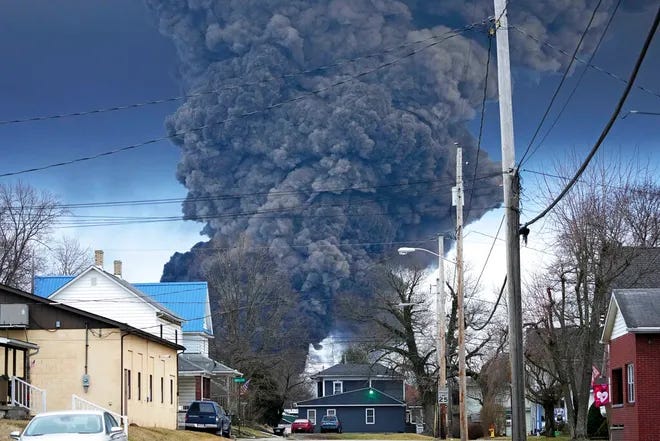Perhaps you have heard about the train derailment in the Ohio town of East Palestine, which set off a toxic chemical scare and a federal evacuation order and appears to be wreaking havoc on the residents’ health and lives. It happened on February 3, eleven days ago, and even I — a person who works in a digital newsroom and is on Twitter a lot — only realized it was happening this past weekend, at least a week afterwards.
That’s bad enough (it’s real bad), and there are all kinds of reasons that might be true, including a certain tendency among the national media to under-cover stories that would be bigger deals if local newsrooms, with their finger on the pulse of communities, weren’t being gutted by hedge funds at an abominable pace. (This truly is one of the biggest threats to our democracy and the fabric of American life, but, you know, people want their fact-based news for free, if they want it at all.)
Anyhow, the deep irony of this story is that the residents of East Palestine, Ohio were not so long ago extras in Noah Baumbach’s film version of White Noise (on Netflix, released right after last Christmas, I wrote about it). The prominent axis around which the film partly rotates is something called “the Airborne Toxic Event,” which is creepily similar to what just happened. People are forced to flee their homes when a plume, somewhat inexplicable and certainly not something they want to be confronted with, threatens their lives and livelihoods in their homes. Our main character exposes himself to it inadvertently and finds out it will shorten his life.
It’s bleak, and also — really weird.
But one of the reasons you probably didn’t hear about it if you weren’t on Twitter, or even if you were, is that there’s just so much stuff that’s terrible that’s happening. The military keeps shooting literal unidentified flying objects that may or may not be spying on us from out of the sky. There’s a “tripledemic” on. American cities have undrinkable water. The weather is insane; earthquakes have decimated whole Turkish cities; layoffs at random and without a clear purpose; people are getting shot for no reason; there are wars and assassinations and assaults on freedom of inquiry from government leaders, and my phone feels like it’s always buzzing off the hook with bad news alerts. Hard to know what to look at.
Weeks ago we went to the end of the David LaChapelle show at Fotografiska, which included his three-part video work Revelations, which depicts a version of the apocalypse, kind of. Here’s the first bit, filmed in what seems to be a strip mall in LA:
And here is the third part, which will become important in a moment:
If you watch to the end, where the forest fires are on the news, you’ll see that the fake chyron on the fake CNN footage says the following:
Every night on the news now, practically, is like a nature hike through the Book of Revelations.
The only note I took in the gallery was of that quotation (though the show blew me away). I tend to spark to mentions of Revelation and apocalypse since I co-wrote a book on it in early 2016 (presciently, unfortunately, titled How to Survive the Apocalypse), but this one really struck me as deeply true. And I don’t watch the news anymore, but, I mean, Twitter.
All of which returned to me when I saw Knock at the Cabin, a movie I consider pretty stupid and potentially offensive in its ham-handed treatment of what should be serious existential questions. (Seriously, I hated it.)
But midway through, before I knew how much I’d hate it and still had some hope, I was struck by one genius idea the movie has, which is that it would be pretty easy to dupe anyone into thinking the apocalypse was happening, if you just flicked on the TV. Some combination of visibility into the trauma and chaos going on all over the world, combined with rapid ecological change and rising tides of violence and authoritarianism (one wonders why Left Behind-obsessed people don’t really understand “antichrist”), combined with the need to juice media profits with unending fear and rage — all of this means the apocalypse seems nigh at every moment, and if you try to deny it, you feel like the crazy one. Maybe you are.
The thing I learned writing How to Survive the Apocalypse is that historically, as in throughout all of human history, apocalypse is less about “endings” and “destructions” than cosmic reset buttons getting mashed by the powers that drive our lives. They show us what’s really going on; they unmask, push aside the curtain, draw back the veil. If we have eyes to see. If we have ears to listen. If we’re not too preoccupied with our own rage and fear to look beyond the ends of our noses.
What comes next? I don’t know.
Art maybe tells us. Or at least keeps us living. And pulling back the curtain.
Enjoyed this? If you’re feeling it, I won’t object if you buy me a cup of coffee. Writers need fuel.




This, and your "Syllabus for a new world" that you linked to, have given me so much to think about and so many things to add to my "to read" list - thank you!